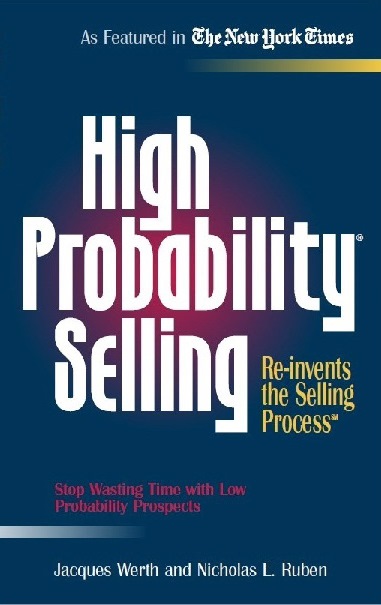
So You’ve Read the Book – Now What?
If you have any questions about High Probability Selling, we are having a live and interactive video meeting on Zoom
By Jacques Werth, President
High Probability® Selling
Q: How can you tell if a salesperson is lying?
A: His lips are moving. (just joking?)
Do most prospects believe what you say? If your answer is “Yes,” you are probably already a very successful salesperson. If your answer is “No” or “Sometimes,” you face skepticism, doubt, and occasional hostility on a daily basis. It’s not fun and not very rewarding.
What causes prospects to doubt and challenge much of your "pitch"? How can you overcome distrust quickly, efficiently, and effectively?
Self-doubt leads to mistrust. When salespeople doubt themselves, others quickly sense it and become doubtful.
Uncertainty creates mistrust: If you’re afraid to say "I don’t know," and try to cover up your uncertainty, others sense it and become skeptical.
Over-eagerness engenders mistrust: If you try to compensate for feeling anxious by being inappropriately cheerful, others become wary and skeptical.
Feeling defeated often leads to defeat: If you expect "just another rejection" when you approach a prospect, prospects sense it, and will likely reject you. Begin developing genuine self-confidence. Learn techniques for disrupting your personal negative thought patterns and replacing them with positive expectations. Learn to stop sabotaging your own success.
How do you get people to believe and trust you? By being genuinely trustworthy, with prospects and with yourself. Are you? If the answer is "No," you need to learn to trust yourself.
If you want to learn the process and mindset of top producing salespeople, you want to learn more about High Probability Selling.
Until Next Time…Sell Well
Jacques Werth – High Probability Selling
Copyright 2007.
Tags: How+to+sell, The+secret+to+selling, Selling+and+Persuasion

If you have any questions about High Probability Selling, we are having a live and interactive video meeting on Zoom
Ultimately, staying in the game is the deepest Why behind our decisions. When examining how we make our decisions, we
Take the first step toward mastering a proven sales system that works. Whether you’re just starting with the High Probability Selling book or looking for advanced training and coaching, we have the tools to help you succeed. Explore our resources and begin transforming the way you sell—consistently and confidently.